In this article:
Parents the world over, whether working or stay-at-home, would unanimously agree that the health and wellbeing of their children figures at the top of their priority list. Moreover, society has a stake in ensuring their healthy growth and development as well since the future rests entirely on their young shoulders.
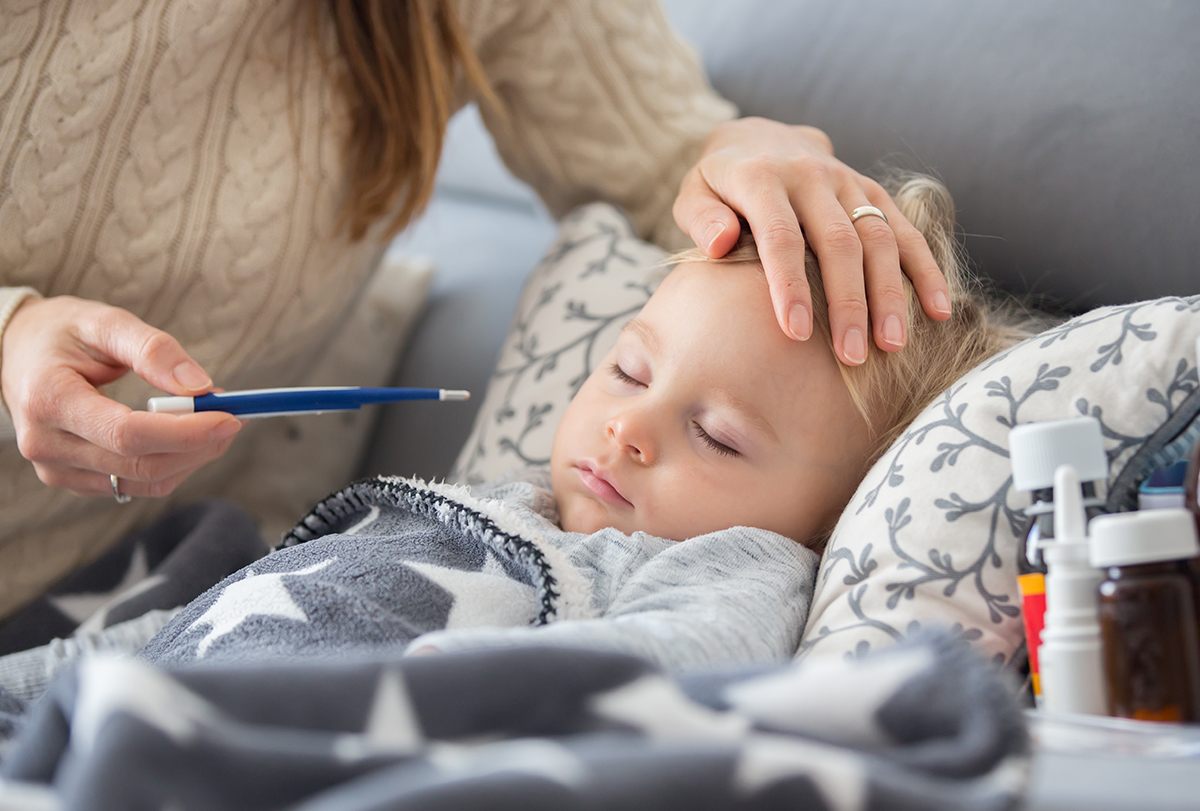
The early years of a child’s life are especially marred by frequent bouts of minor illnesses and infections. An underdeveloped immune system makes it easier for your young one to catch the occasional bug than older children and adults.
Common Children’s Health Issues
The most common children’s health issues include:
- The common cold
- Coughs
- Diaper rashes
- Ear infections
- Cold sores
- Asthma
- Diarrhea
- Toothaches
- Stomachaches
- Skin rashes
- Allergies
- Parasitic infections
- Conjunctivitis
- Warts
- Lice
Causes of Common Children’s Health Issues
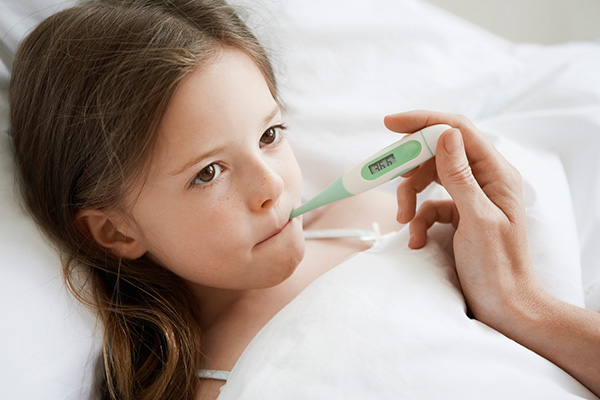
Bacteria and viruses, which are naturally present in our environment.
Because a child’s immune system is weak, children get sick more often than adults when exposed to these harmful agents.
As children get older, their immune systems develop and they gradually acquire the immunity to fight off many common infections that are otherwise a threat during their initial years.
Conventional and Adjunctive Treatments: Best of Both
Rather than feeding your child drugs that work only to mask the problem while engendering potentially long-term and detrimental side effects, you should look for alternative ways to provide natural and holistic healing from within.
There’s a whole list of readily available ingredients that can give your kid’s immunity a push and remedy a number of common health issues.
One should not take this to mean that parents must swear off conventional drugs. The use of stronger drugs is not to be discredited as a whole. The idea is to minimize the medicinal load on your child’s developing body as much as safely possible.
Certain ailments are too severe or advanced that they lie beyond the purview of alternative or complementary medicine. When faced with such situations, it would be a gross misjudgment to rely on these complementary ingredients to take care of the problem.
Whatever the malady, however severe or mild it might seem, the first step towards ensuring your child’s recovery is to consult your pediatrician. Taking your child’s health entirely in your hands without any concern for possible complications is a risk no parent can afford.
Hence, keep your options open, but do enlist your doctor’s professional advice to make sure that you are on the right track.
An estimated 6.3 million children died before reaching the age of 15 years in 2017, as per the data released by the World Health Organization. Of the 6.3 million children, 5.4 million were under the age of 5, and 2.5 million died within the first month of life. (1)
What makes these numbers even more alarming as well as infuriating is the fact that more than half of these early child deaths were easily avoidable, that could have been easily prevented or treated with access to simple, affordable interventions. (1)
Tips to Prevent Your Child From Common Health Issues
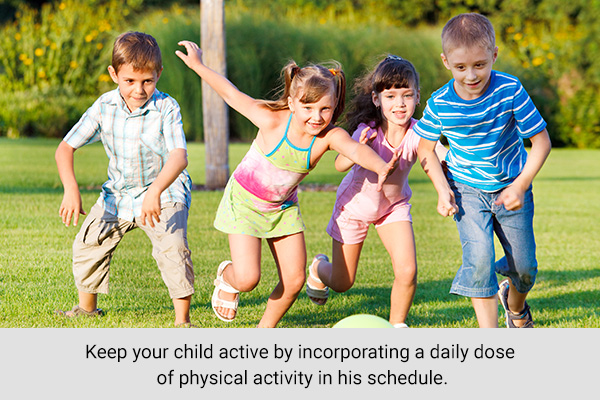
Instead of worrying, parents should work to boost their child’s immunity and seek the active involvement and cooperation of their childcare provider.
To boost your child’s immune system:
- Feed your child a well-rounded diet replete with the whole spectrum of nutrients that he/she requires to grow.
- Make sure your child gets enough sleep at night and proper rest during the day.
- Keep your child active by incorporating a daily dose of physical activity in his/her schedule.
- Ensure your child’s safety and give him/her a healthy environment to thrive, both mentally and physically.
Some of the tips that parents should follow to keep their children in the pink of health are:
1. Ensure that your child is not behind his recommended vaccine schedule
Consult with your pediatrician to stay abreast of any upcoming immunization dose that your child may require. Typically, a baby goes through the immunization rounds at the ages of 12 months, 18 months, and 24 months.
This preventive measure not only keeps your child safe from potentially fatal diseases like measles and diphtheria, but it is also essential for staving off an outbreak in the community at large.
2. Never administer an unprescribed medication to your child
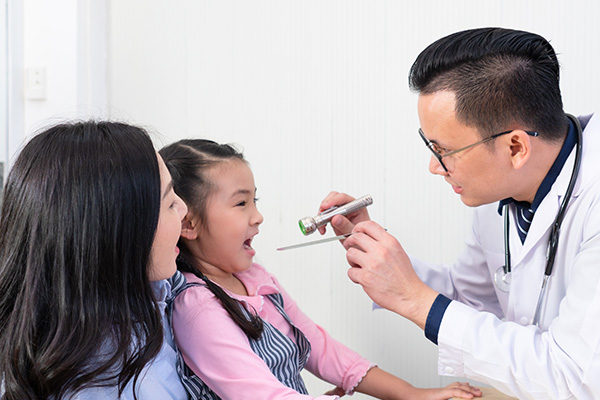
Medicines that might seem safe and even beneficial for adults might not agree with your child’s fragile systems. It’s, therefore, highly ill-advised to feed your child a common household medicine of your own accord. Always check with your pediatrician if a particular drug is suitable for your kid.
Moreover, you should also adhere to the dosage stipulated by the doctor, or follow the instruction strip that comes with the packaging. Even in the case of herbal treatments, certain ingredients might prove dangerous for your kid’s health and must be cleared by the pediatrician before use.
3. Make sure that your child breathes in fresh, clean air
It is crucial to ensure a smoke-free breathing environment for your child to keep his/her respiratory system fighting fit. Given the sky-rocketing levels of pollution, most parents are rendered helpless in keeping themselves and their young one’s shielded from environmental toxins.
However, you can minimize your baby’s exposure to second-hand smoke by making your home a cigarette-free zone. If you are a smoker, a good way to start is to kick the habit yourself. Moreover, ask other family members and visitors to smoke outside the house, if at all.
Another critical measure in this regard is to refrain from using chemical household sprays, like insect repellent or cleaning products, when your child is in the room.
4. Hygiene is the most important pace
Hygiene is the paramount and most indispensable step for warding off illnesses and ensuring your own health as well as of those around. In the same vein, it is every parent’s duty to teach their kids by example about personal cleanliness and sanitary practices.
Since children are at an impressionable age, they pick up on these habits quite naturally and imbibe them for the rest of their lives. Parents can set the example early by teaching their children to practice frequent hand washing, especially after using the bathroom and playing outside as well as before and after eating.
They should also frequently wash toys, bedding, clothes, and other personal things that their children use.
5. Maintain your child’s dental health
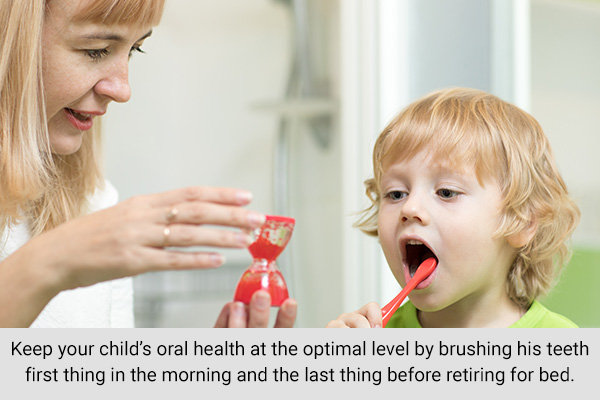
Keep your child’s oral health at the optimal level by brushing his teeth first thing in the morning and the last thing before retiring for bed.
Since children below the age of 18 months have an exceptionally sensitive and delicate oral cavity, its best to use a gentle bristled brush that’s soaked in water to scoop out any gunk that might be stuck.
Consult your dentist about the right time to advance to a pea-sized amount of low-fluoride toothpaste, once your child crosses 18 months.
6. Protect your child from undue sun exposure
Make your child wear protective clothing, or slather some gentle sunscreen on his/her skin, whenever venturing out in the sun.
When Should Parents Consult the Doctor?
Even the most observant and proactive parents can fail to pick up on some seemingly harmless issue that might be hampering your child’s health without you knowing it.
For instance, mild viral or bacterial infections are often disregarded as a common occurrence. However, in the absence of timely and appropriate treatment, they can spiral into a more severe condition that can take a significant toll on your kid’s well-being.
Despite all your good intentions and efforts to ensure your child’s health, it is essential for every parent to keep their pediatrician in the loop. Only a medical professional can discern if a particular treatment is suitable for your child’s condition, after taking into account his/her medical history, age, and symptoms.
If you suspect that your child’s symptoms are getting progressively worse, or if he/she is displaying additional symptoms overtime, a visit to the doctor is warranted. Also, if the condition shows no signs of improvement even after a few days of prescribed treatment, take your child to the pediatrician without delay.
Final Word
Newborns as well as school-going children are easy targets for a wide array of disease-causing pathogens and tend to fall sick several times a year. But the problem doesn’t stop there. Once your child comes down with a contagious illness, he/she is likely to spread the bug around to other kids he lives, plays or interacts with.
In fact, it’s not uncommon for parents tending a sick child to pick up the infection themselves. Moreover, the prolonged discomfort and malaise can be extremely exacting for your baby’s vulnerable physical state and can end up causing long-term damage to his/her nascent organs.
Thus, timely and appropriate treatment is imperative for stopping the disease in its tracks. This, however, does not imply that you should resort to strong and harsh mainstream medicines every time your child shows the slightest sign of discomfort.
Excessive dependence on over-the-counter drugs, steroids, and antibiotics is counter-productive for building the body’s immune response, more so in the case of children.
Pumping your child’s system with steroids can lead to an increase in aggressive behavior, while cough syrups can cause severe respiratory issues. Similarly, antibiotic excesses tend to make bacteria more resistant to the drugs over time.

- Was this article helpful?
- YES, THANKS!NOT REALLY



